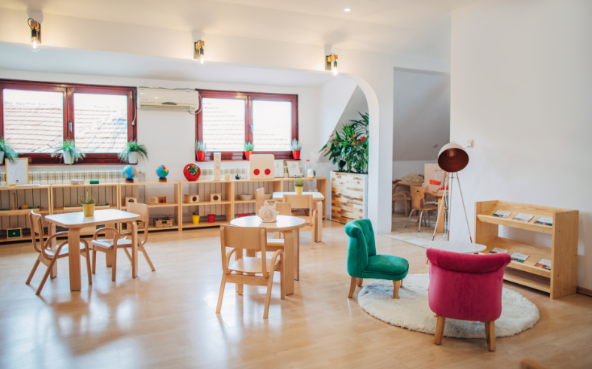The design of preschool environments plays a crucial role in shaping early childhood learning experiences. A well-structured space fosters creativity, exploration, and engagement, providing children with an environment that supports their cognitive, social, and emotional development. In Singapore, educators and designers are embracing innovative approaches to preschool design, transforming traditional learning spaces into dynamic, child-centric environments. Here are the ways preschool spaces are evolving to meet the needs of young learners.
Embracing Child-Led Learning Environments
Preschools are shifting towards spaces that encourage children to take charge of their learning. A Reggio Emilia preschool in Singapore adopts this approach by incorporating open-ended materials, flexible seating arrangements, and interactive stations. Classrooms are designed to be fluid, allowing children to explore different areas based on their interests. This setup fosters independence and curiosity, helping young learners develop problem-solving skills and creativity.
Integrating Natural Elements into Learning Spaces
Exposure to nature enhances cognitive development and sensory exploration. Modern preschool spaces incorporate natural materials such as wood, plants, and stone to create a calming and engaging environment. Outdoor play areas, garden classrooms, and indoor green spaces interact with nature, fostering a deeper connection to the world around them. Nature for preschool design supports emotional well-being while encouraging hands-on learning experiences.
Designing Multi-Functional Classrooms
Flexibility is key in early childhood education. Preschools are moving away from rigid classroom layouts and introducing adaptable spaces that can serve multiple functions. Learning corners, modular furniture, and movable partitions enable teachers to transform the classroom setup based on daily activities. A Northpoint preschool, for instance, might feature spaces that can transition from group learning areas to quiet reading zones, ensuring that children’s varied learning styles are accommodated.
Encouraging Interactive and Play-Based Learning
Play is fundamental to early childhood development. Preschools are incorporating interactive elements such as sensory walls, imaginative play corners, and activity stations to engage young learners. These features stimulate problem-solving, fine motor skills, and social interaction. Reggio Emilia in Singapore emphasises hands-on learning through art, music, and dramatic play, creating spaces where children can express themselves freely and develop essential life skills.
Enhancing Safety and Accessibility
Creating a safe and accessible learning environment is a priority in preschool design. Child-friendly furniture, rounded edges, and non-slip flooring ensure physical safety, while inclusive design elements support children of all abilities. Open layouts and clear sightlines allow educators to monitor activities effectively. Additionally, accessible play structures and adaptive learning tools ensure that every child can engage fully in classroom activities.
Incorporating Digital Learning Tools Thoughtfully
Technology is becoming an integral part of education, even at the preschool level. Interactive whiteboards, digital storytelling stations, and age-appropriate learning apps are incorporated into classroom design to enhance engagement. However, the emphasis remains on balanced learning, ensuring that screen time is complemented by hands-on activities. Preschools in Singapore are integrating technology to support creativity and collaboration rather than replacing traditional learning methods.
Promoting Social Interaction Through Shared Spaces
Collaboration and social skills are essential for early childhood development. Preschool designs now include shared spaces such as communal reading nooks, open activity areas, and group discussion zones. These spaces encourage teamwork, communication, and peer learning. The layout of these areas fosters interaction among children, helping them develop important social skills that will benefit them in their later years.
Learn More: Fun and Learning: Adventures in Our Playgroup!
Creating Calming and Sensory-Friendly Spaces
Preschool environments can be overwhelming, making it essential to provide spaces where children can relax and self-regulate. Quiet corners, soft lighting, and sensory rooms offer children a place to unwind when needed. Sensory-friendly elements ensure that children with different needs can engage comfortably in the learning process. Thoughtful classroom design creates a balanced environment that supports both active learning and moments of quiet reflection.
Fostering Parent and Community Engagement
Preschools are increasingly incorporating areas that encourage parental involvement and community interaction. Designated parent engagement spaces, observation rooms, and community gardens help build a strong connection between families and educational institutions. Involving parents in the learning process strengthens the support system for children and enhances the overall preschool experience.
Future-Proofing Preschool Spaces for Evolving Needs
As education evolves, preschool environments must remain adaptable. Flexible layouts, modular learning spaces, and sustainable building materials ensure that classrooms can meet future demands. Designing with longevity in mind allows preschools to continue supporting early childhood education effectively, regardless of changing pedagogical approaches.
Reimagining preschool spaces in Singapore is essential for fostering engaging and dynamic learning environments. By embracing flexible layouts, integrating natural elements, and prioritising interactive learning, preschools can create spaces that support early childhood development.
For more information about preschool learning environments, contact Apple Tree Playhouse today.

